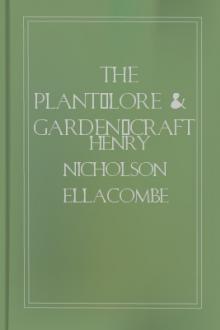South Wind(Fiscle Part-3), Norman Douglas [most important books of all time .TXT] 📗

- Author: Norman Douglas
Book online «South Wind(Fiscle Part-3), Norman Douglas [most important books of all time .TXT] 📗». Author Norman Douglas
Had Hitherto Encountered; More Profound, More Veracious. Already He
Formed The Project Of Returning To Listen To His Melodious Voice, And
Learn Some More About That Hellenic Life Which Had Hitherto Been A
Sealed Book To Him. Nobody Every Spoke To Him After The Count's
Fashion. He Contrasted His Address With The Bantering, Half-Apologetic,
Supercilious Tone Of Those Other Elderly Persons Who Had Heretofore
Deigned To Enlightened Him. He Was Flattered And Pleased At Being Taken
Seriously And Bidden To Think In This Straightforward, Manly Fashion;
It Unstrung His Reserve And Medicined To His Wounded Self-Respect.
"So Your Mother Would Like To See You In Parliament?" Asked The Count.
"Politics Are Apt To Be A Dirty Game. One Cannot Touch Dirt Without
Soiling One's Hands. We Have A Deputy Here, The Commendator
Morena--Well, One Does Not Like To Speak About Him. Let Me Ask You A
Question, Mr. Denis. Why Do Politicians Exist?"
"I Suppose The Answer Would Be That Is Profitable To Mankind To Be Run
By Somebody."
"Profitable, At All Events, To Those Who Do The Running. Your Good Sir
Herbert Street Has Lately Sent Me A Batch Of Books About The Ideal
Public Life Of The Future. Socialistic Forecasts, And That Kind Of
Literature. He Is A World-Improver, You Know, Among Other Things. They
Have Amused Me More Than I Thought They Would. That Venerable Blunder:
To Think That In Changing The Form Of Government You Change The Heart
Of Man. And In Other Respects, Too, These Dreamers Are At Sea. For
Surely We Should Aim At Simplification Of Machinery. Conceive, Now, The
State Of Affairs Where Everybody Is More Or Less Employed By The
Community--The Community, That Comfortable Word!--In Some Patriotic
Business Or Other. Everybody An Official, All Controlling Each Other!
It Would Be Worse Than The Spanish Inquisition. A Man Could Live At
Toledo By Subscribing To Certain Fixed Opinions; He Could Be Assured Of
A Reasonable Degree Of Privacy. Nothing Could Save Him, Under
Socialism. An Insupportable World! When People Cease To Reflect They
Become Idealists."
"I Suppose They Do," Replied Denis, Rather Dubiously. Then It Struck
Him That This Might Account For His Own Hazy State Of Mind--This Lack Of
Occupation Or Guiding Principle. For The Rest, He Had Not Given Much
Thought To Such Questions. To Be A Politician--It Was One Of The Few
Projects Which Had Never Seriously Entered His Head. After A Pause, He
Remarked:
"I Can't Help Noticing That Portrait Over There. It's A Very Pretty
Thing."
"The Little Pastel? It Is A Sketch Of My Daughter Matilda. I Did It
Myself When She Was Here Last Christmas. Poor Child, She Can Only Come
For The Holidays; There Is No Chance Of A Respectable Education O This
Island. But I Can Run Over To See Her Every Now And Then. You Will
Observe I Am Not Much Of A Colourist!"
"You Have Been Parsimonious With The Tints. It Reminds Me Of Some Of
Lenbach's Work Which I Saw At Florence; It Is In The Same Manner."
"It Appears You Like Art," Said The Count. "Why Not Devote Yourself To
It? But Perhaps Your English Social Conditions Are Not Propitious. Here
Is A Letter From A Friend Of Mind Which Arrived This Morning; You Know
His Name--I Will Not Mention It! A Well-Known Academician, Whose Life Is
Typical Of Your Attitude Towards Art. Such A Good Fellow. He Likes
Shooting And Fishing; He Is A Favourite At Court, And Quite An
Authority On Dress-Reform. He Now Writes To Ask Me About Some Detail Of
Greek Costume Which He Requires For One Of His Lectures To A Ladies'
Guild. Art, To Him, Is Not A Jealous Mistress; She Is An Indulgent
Companion, Who Will Amiably Close An Eye And Permit A Few Wayside
Flirtations To Her Lover--Enthusiasms For Quite Other Ideals, And For
The Joys Of Good Society In General. That Is The Way To Live A Happy
Life. It Is Not The Way To Create Masterpieces."
"I Would Take Myself Seriously, I Think," Said Denis. "I Would Not
Dissipate My Energies."
He Meant It. To Be An Artist--It Dawned Upon Him That This Was His True
Vocation. To Renounce Pleasure And Discipline The Mind; To Live A Life
Of Self-Denial, Submitting Himself Humbly To The Inspiration Of The
Great Masters. . . . To Be Serene, Like This Old Man; To Avoid That
Facile, Glib, Composite Note--Those Monkey-Tricks Of Cleverness. . . .
Then, After This Vision Had Passed Before His Eyes Like A Flash, He
Remembered His Grief. The Notion Of Becoming A World-Famous Artist Lost
All Meaning For Him. Everything Was Blighted. There Was Not A Grain Of
Solace To Be Found On Earth.
The Count, Meanwhile, Was Looking With Concern Upon His Companion's
Grave Face, Whose Flawless Profile Might Have Emerged Into Life Under
The Thought-Laden Chisel Of Lysippus. He Wondered What He Could Say Or
Do To Drive Away This Melancholy. The Youth Had Been So Bright That Day
At The Entertainment Of The Duchess; He Seemed To Have Stepped Straight
Out Of A Sunny Dialogue Of Plato. Serious Trouble Now Shone Out Of His
Eyes. Something Had Happened. Something Was Wrong With Him; Wrong,
Too--He Reflected--With A World Which Could Find No Better Occupation For
Such A Person Than To Hand Round Buttered Tea-Cakes At An Old Woman's
Party To A Crowd Of Cosmopolitan Scandalmongers.
Denis Rose, Remarking:
"I Wish I Could Stay A Little Longer! But It Is Getting So Late. I'm
Afraid I Must Be Going."
He Held Out His Hand.
"You Have Caught Me In A Somewhat Sad And Depressed Mood, I Fear,"
Replied The Other, Heaving A Most Artistic Sigh. And His Features
Suddenly Looked Quite Careworn. As A Matter Of Fact, He Had Not Been So
Joyous For Many Long Years--That News Of Mr. Van Koppen's Proximate
Arrival Having Made Him Feel Fifty Years Younger And, But For His
Ingrained Sense Of Hellenic Moderation, Almost Ready To Dance With
Delight.
"I Am Sorry I Have Been So Despondent," He Went On. "Sometimes One
Cannot Help Oneself. It Shall Not Occur Again! I Will Try To Be More
Amusing Next Time You Come. If I Thought It Would Help, I Would
Communicate My Sorrows And Claim Your Sympathy. But What Does It Avail
To Unburden Oneself? Friends Will Share Our Joys, But Every Man Is A
Solitary In His Griefs. One Soon Finds That Out! One Soon Realizes The
Vanity Of All Those Talks About The Consolations Of Philosophy And The
Comforts Of Religion, Doesn't One? I Suppose Even You Have Your Moments
Of Dejection?"
"One Worries About Things Now And Then. It Is Perfectly Natural, I
Daresay."
"Perfectly. We Are Not Stones--Least Of All Persons Like Yourself. I
Would Not Be At Your Age Again, Not For The Wealth Of Croesus! I
Suffered Too Much. All Young People Suffer Too Much; They Bear It
Silently, Like Heroes. The Eye Of Youth Dilates And Distorts The
Images. The Focussing Process Is Painful. Youth Has No Norm. It Was In
One Of My Worst Fits Of Despondency, I Remember, That My Old Teacher
Gave Me Certain Advice, After I Had Puzzled It Out, Did Me Some Good.
In Fact, I Have Acted Upon It To This Very Day; I Recall It As Plainly
As If He Were Speaking Now. Well, I Am Sorry You Are Leaving. I Would
Keep You Hear If I Could. But I Hope You Will Not Forget To Come
Another Day. You Have Cheered Me Up Wonderfully! Shall Andrea Find You
A Carriage?"
"What Did He Say?" Asked Denis.
"The Old Teacher? Let Me See. . . . He Said: Do Not Be Discomposed By
The Opinions Of Inept Persons. Do Not Swim With The Crowd. They Who Are
All Things To Their Neighbours, Cease To Be Anything To Themselves.
Even A Diamond Can Have Too Many Facets. Avoid The Attrition Of Vulgar
Minds; Keep Your Edges Intact. He Also Said: A Man Can Protect Himself
With Fists Or Sword But His Best Weapon Is His Intellect. A Weapon Must
Be Forged In The Fire. The Fire, In Our Case, Is Tribulation. It Must
Also Be Kept Untarnished. If The Mind Is Clean, The Body Can Take Care
Of Itself. He Said: Delve Deeply; Not Too Deeply Into The Past, For It
May Make You Derivative; Nor Yet Into Yourself--It Will Make You
Introspective. Delve Into The Living World And Strive To Bind Yourself
To Its Movement By A Chain Of Your Own Welding. Once That Contact Is
Established, You Are Unassailable. Externalize Yourself! He Told Me
Many Things Of This Kind. You Think I Was Consoled By His Words? Not In
The Slightest Degree. I Was Annoyed. In Fact, I Thought Him Rather A
Hypocrite; Anybody Could Have Spoken As He Did! I Was So Disappointed
That I Went To Him Next Day And Told Him Frankly What I Thought Of His
Counsel. He Said--Do You Know What He Said?"
"I Cannot Even Guess."
"He Said: 'What Is All Wisdom Save A Collection Of Platitudes? Take
Fifty Of Our Current Proverbial Sayings--They Are So Trite, So
Threadbare, That We Can Hardly Bring Our Lips To Utter Them. None The
Less They Embody The Concentrated Experience Of The Race, And The Man
Who Orders His Life According To Their Teaching Cannot Go Far Wrong.
How Easy That Seems! Has Any One Ever Done So? Never. Has Any Man Ever
Attained To Inner Harmony By Pondering The Experiences Of Others? Not
Since The World Began! He Must Pass Through The Fire.'"
"I Had No Teacher Like That," Observed Denis. "He Must Have Been A Man
Of The Right Kind."
"Oh, He Meant Well, The Old Rascal," Replied The Count With A Curious
Little Smile.
Chapter 14
Denis Descended From The Old Town. At A Turn Of The Road He Overtook
The Bishop Who Was Moving Slowly In The Same Direction.
"How Is Mrs. Meadows?" Enquired The Young Man.
"Not Particularly Well, I'm Afraid. And The Count?"
"Oh, Quite All Right."
They Walked Along In Silence, Having Little To Say To Each Other. That
Visit Had Done Denis Good; He Would Return Soon Again, If Only For The
Purpose Of Cheering Up The Lonely Old Man Who, At The Last Moment, Had
Given Him A Photograph Of The Locri Faun, With A Kindly Inscription
From Himself. He Was Not To Show It To Anybody, The Count Had Said--Not
Yet! The Government Must Not Hear About That Relic--Not Yet! Later On,
Perhaps Very Soon, Everything Would Be In Order. Denis Cherished That
Photo In His Pocket. He Was Thinking, Too, Of The Pastel--The Face Of
Matilda, Which Seemed Like A Star Shining Through The Mist. . . . Then
He Remembered The Bishop Walking At His Side. He Felt He Ought To Say
Something More To This Dry Colonial Whom He Could Not Help Contrasting,
Greatly To His Disadvantage, With The Count.
"Hasn't It Been Hot To-Day?"
"Stifling," Replied Mr. Heard. "The Warmest Day We Have Had, So Far.
Not A Breath Of Wind."
"Not A Breath. . . ."
The Conversation Flagged Once More. They Did Not Hit It Off, Somehow;
They Seemed To Drift Further Apart Every Time They Met. Each Was
Preoccupied With His Own Thoughts. The Bishop Was More Taciturn Than
Usual; The Interview With His Cousin Had Not Been Quite A Success.
Denis, After A While, Made Another Effort. He Spoke Of Some Of Count
Caloveglia's Antiquities And, One Thing Leading To Another, Told Mr.
Heard The Story Of A Friend Of His In Florence Who Had Excavated Some
Wonderful Early Italian Pots, Fragments O Them, Out Of An Old Garden
Well. They Were All Lustred, He Said.
"That Must Have Been A Very Pleasant Surprise," Observed The Bishop,
Who Had Small Use For Lustred Ware And Lunatics Who Collected It.
Feeling That It Was His Turn To Say Something, He Remarked:
"I Am Dining With The Duchess To-Night. Will You Be There?"
"No," Replied The Young Man With An Unwonted Air Of Decision. Never
Again Would He Be Seen In That Austere Old Convent, Built By The Good
Duke Alfred. Never Again! Promptly, However, He Toned Down The
Harshness Of His Answer By Adding That The Lady





Comments (0)